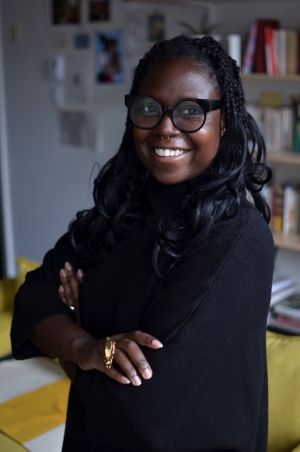Eunice Bélidor, BFA (art history) 12, has always loved colour, texture and shape. Growing up in northeast Montreal, she dreamed of a career in fashion. A first-year CEGEP course in how to perceive art through the ages did not change her mind so much as shift it.
Recently named the Gail and Stephen A. Jarislowsky curator of Quebec and Canadian contemporary art (1945 to today) — the first Black curator at the Montreal Museum of Fine Arts (MMFA) — Bélidor is at once an art expert and a role model, filtering the job through the prisms of history, convention and race; a 21st century pioneer helping to break the path for others to follow.
“I am always the Black curator,” Bélidor says the morning after Derek Chauvin, the former Minneapolis police officer, was found guilty of murdering George Floyd, whose death in 2020 sparked furious, passionate Black Lives Matter protests around the world.
“Sometimes, I ask myself what it would mean for a potential employer to have me work in their institution. Am I expected to decolonize it?” she continues. “I often wear a lot of hats other than curator; most times, though, all I want to do is curate and work without always having to lead some fight.”
Among Bélidor's first orders of business at the MMFA is to consider which pieces of art will enter the museum’s collection and how to best showcase them. But her goal is what she has worked and fought for since she was a student, namely, to give artists a venue in which they can be introduced to the public, for the public can get to know them, so that each can learn from the other.
‘I wanted to get my name out there’
Bélidor’s interests and expertise are wide and varied; her independent study project in her final year at Concordia revolved around local artists from Haiti, where her parents come from, bringing their stories and points of view to the forefront. Whenever she had doubts, or was nervous, she turned to her advisor, Concordia art historian Alice Ming Wai Jim, who would tell her to trust her instinct.
“She helped me understand the environment that led to these artists having a lack of representation,” she says. “Alice made my work legitimate.”
Bélidor, 34, says once she realized she wanted a career in the art world, she would be better off with a graduate degree. After living in Montreal all her life, she moved to Toronto, where she completed both an MA in art history and visual culture, and a graduate diploma in curatorial studies at York University.
While at York, Bélidor worked at the Power Plant, a contemporary art gallery on the waterfront. Upon graduation, she returned to Montreal to work at articule, an artist-run centre committed to social engagement, experimentation and interdisciplinary endeavours. In 2019, she returned to Concordia as the director of the FOFA Gallery, a position she fully expected to keep when she applied to for the MMFA job.
“I just wanted to get my name out there, let them know I was interested,” she says.
Looking ahead
If she had to choose a FOFA project she is most proud of, it would be her last, in which she asked artists to write letters about their art, their isolation and their dreams post-pandemic. The letters were put together in a newsletter and online — a marriage of a lost art with the technology of the 21st century.
“It was an idea from my own independent curatorial practice, to understand how we can think of artists’ practice through letter writing,” she says. “We used our newsletter as our gallery space.”
In the immediate future, Bélidor, who sits on the university’s President’s Task force on Anti-Black Racism to help Black people navigate academia and the institution in general, plans to continue to support artists; to take time and work for change.
“When George Floyd was murdered last May, I took the day off work to contemplate and just breathe — deep, long breaths,” she says. “I’m too new to the museum to do the same thing today [following Chauvin’s arrest], but I’m excited and challenged.
"And my parents, whom I told the day before the news got out, really understood that I was working at the museum, so they are very proud.”


 Art history graduate Eunice Bélidor | Photo: Charlène Daguin, 2020
Art history graduate Eunice Bélidor | Photo: Charlène Daguin, 2020


